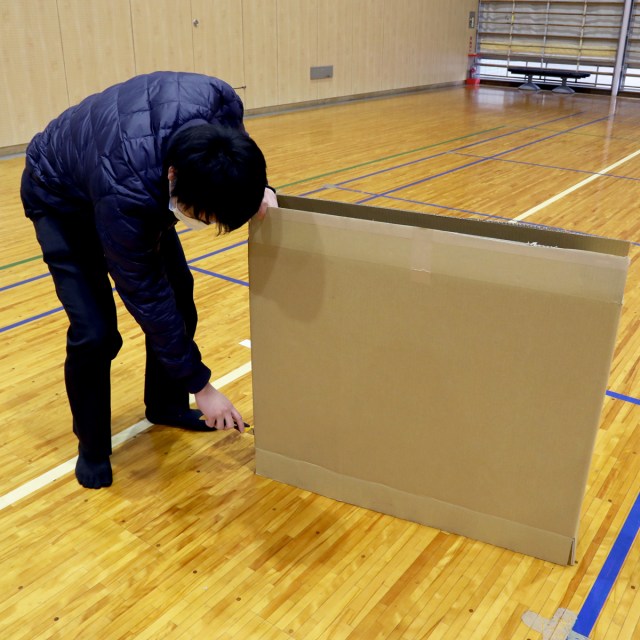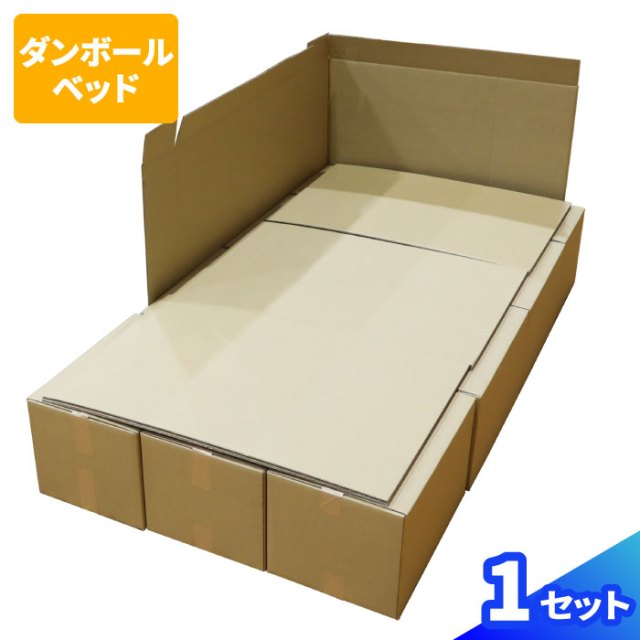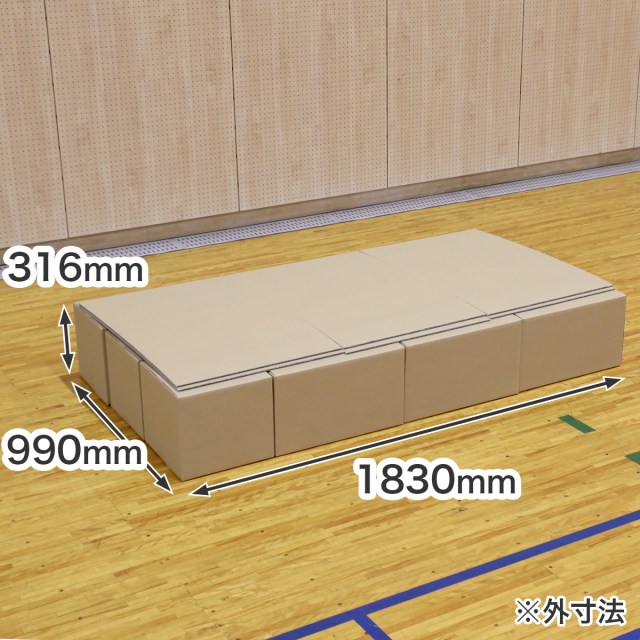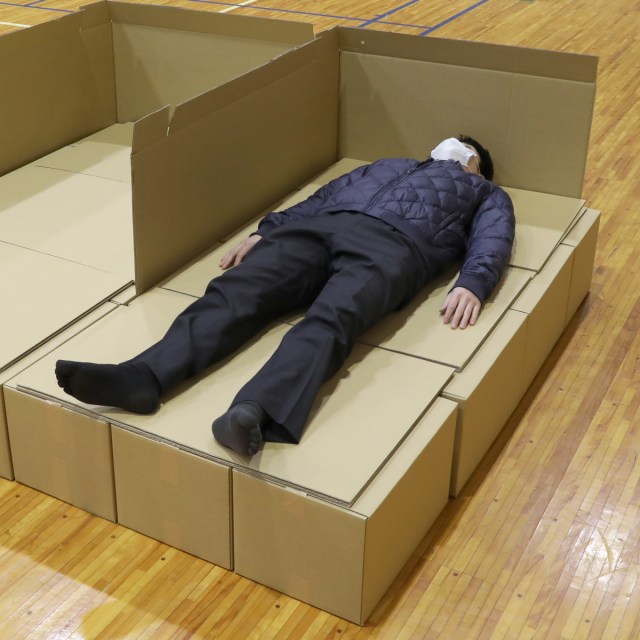
The economics of sleeping on cardboard are trickier than you think.
Cardboard beds became big news last year when the Olympics came to Tokyo and everyone thought they were some sort of enforced abstinence measure. Actually, they’ve been around for quite a while in Japan, mainly for use at evacuation centers because they are quick and easy to mass produce, transport, and dispose of when finished.
However, it is also important to ensure a comfortable night’s sleep, which is especially hard when factoring in the innate prejudice people tend to have of sleeping on cardboard boxes. This creates a difficult balancing act of cost and comfort. Obviously, sleeping on a regular sheet of cardboard that one might use for breakdancing would represent the ultimate in thriftiness. However, the cardboard experts at Aasu Danboru (“Earth Cardboard”) in Saitama Prefecture feel that all too often cardboard bed producers go too far the other way and over-engineer their designs. This requires completely new manufacturing techniques that just end up driving up the cost.
So Earth Cardboard went back to basics and crafted what they call “the industry’s cheapest cardboard bed.” To accomplish this, they kept the design limited to components of regularly shaped cardboard boxes. This keeps production cheap, easy, and – most importantly in an emergency – fast.
It measures 183 by 99 by 31.6 centimeters (72 by 39 by 12 inches) and uses moving-box material topped with two eight-millimeter double wall cardboard sheets for an even surface that is actually slightly thicker than other, more expensive beds. And in order to reduce waste to zero, the cardboard box that these cardboard boxes ironically come in can also be converted into a handy partition.
This bed was designed to last at least seven days, as stipulated by the Disaster Relief Act, and when tested by a man 175 centimeters (5 feet 9 inches) tall and weighing 80 kilograms (176 pounds), no problems occurred during a week of regular use.
Aasu Danboru is also making these beds available to everyone through the Japanese online retail site Rakuten for 5,940 yen (US$50) each. That might seem steep for a bed made of cardboard boxes, but what price can you put on not having to worrying that your bed might implode on you in the middle of the night? Also, for comparison’s sake, the specially designed cardboard desk that was released by another company sold for 26,400 yen ($230).
Even though this bed is designed with disaster relief in mind, there’s no reason that it can’t find its niche among people who just like cardboard stuff too. In fact, we have an inkling our own Mr. Sato may pick one up to go with his cardboard toilet and house.
Source: Rakuten, PR Times
Images: PR Times
● Want to hear about SoraNews24’s latest articles as soon as they’re published? Follow us on Facebook and Twitter!





 From box to bed: This simple item is making life easier for Kumamoto earthquake victims
From box to bed: This simple item is making life easier for Kumamoto earthquake victims The “Rakulet” adds a corrugated layer of luxury to cardboard toilets
The “Rakulet” adds a corrugated layer of luxury to cardboard toilets 10 times to avoid traveling in Japan in 2026
10 times to avoid traveling in Japan in 2026 Our 52-year-old pole dancing reporter shares his tips for achieving your New Year’s exercise goal
Our 52-year-old pole dancing reporter shares his tips for achieving your New Year’s exercise goal Princess Mononoke magnets return just in time to treat yourself to awesome anime decorations
Princess Mononoke magnets return just in time to treat yourself to awesome anime decorations We ate sushi made from Japan’s most expensive tuna ever【Taste test】
We ate sushi made from Japan’s most expensive tuna ever【Taste test】 Japan’s Valentine’s Day gets extra cute with the return of KitKat Heartful Bear【Photos】
Japan’s Valentine’s Day gets extra cute with the return of KitKat Heartful Bear【Photos】 Umamusume anime girl plushie recalled for having parts she absolutely should not have【Pics】
Umamusume anime girl plushie recalled for having parts she absolutely should not have【Pics】 Japanese beef bowl chain Sukiya’s 2026 Smile Box lucky bag basically pays for itself
Japanese beef bowl chain Sukiya’s 2026 Smile Box lucky bag basically pays for itself Bamboo trees vandalized near Kyoto’s Fushimi Inari shrine, foreign graffiti prevalent
Bamboo trees vandalized near Kyoto’s Fushimi Inari shrine, foreign graffiti prevalent Ramen restaurant’s English menu prices are nearly double its Japanese ones, denies discriminating
Ramen restaurant’s English menu prices are nearly double its Japanese ones, denies discriminating Nearly one in ten young adults living in Japan isn’t ethnically Japanese, statistics show
Nearly one in ten young adults living in Japan isn’t ethnically Japanese, statistics show Hayao Miyazaki says Happy New Year to Studio Ghibli fans with new art for Year of the Horse
Hayao Miyazaki says Happy New Year to Studio Ghibli fans with new art for Year of the Horse Starbucks Japan ready to get Year of the Horse started with adorable drinkware and plushies【Pics】
Starbucks Japan ready to get Year of the Horse started with adorable drinkware and plushies【Pics】 Top Japanese cosplayer Enako returns to Comiket after 6 years, creates mayhem with admirers
Top Japanese cosplayer Enako returns to Comiket after 6 years, creates mayhem with admirers Cup Noodle tries an authentic Jiro-style ramen, but something’s not quite right
Cup Noodle tries an authentic Jiro-style ramen, but something’s not quite right The best Starbucks Japan Frappuccinos we want to drink again in 2026
The best Starbucks Japan Frappuccinos we want to drink again in 2026 We revisited Sweets Paradise after a decade to see if Japan’s dessert buffet still delivers
We revisited Sweets Paradise after a decade to see if Japan’s dessert buffet still delivers That time Seiji called JASRAC to ask why he didn’t get paid royalties for his song being on TV
That time Seiji called JASRAC to ask why he didn’t get paid royalties for his song being on TV 7-Eleven Japan starts new temporary luggage storage service in over 300 branches
7-Eleven Japan starts new temporary luggage storage service in over 300 branches Disillusionment at Tsukiji’s tourist-target prices led us to a great ramen restaurant in Tokyo
Disillusionment at Tsukiji’s tourist-target prices led us to a great ramen restaurant in Tokyo Starbucks teams up with 166-year-old Kyoto doll maker for Year of the Horse decorations【Photos】
Starbucks teams up with 166-year-old Kyoto doll maker for Year of the Horse decorations【Photos】 Tokyo considering law requiring more trash cans following litter increase in heavily touristed area
Tokyo considering law requiring more trash cans following litter increase in heavily touristed area Tokyo’s Tsukiji sushi neighborhood asks tour groups to stay away for the rest of the month
Tokyo’s Tsukiji sushi neighborhood asks tour groups to stay away for the rest of the month Tokyo event lets you travel back in time, for free, to celebrate 100 years since Showa era start
Tokyo event lets you travel back in time, for free, to celebrate 100 years since Showa era start Japan may add Japanese language proficiency, lifestyle classes to permanent foreign resident requirements
Japan may add Japanese language proficiency, lifestyle classes to permanent foreign resident requirements Lacquerware supplier to emperor of Japan and Pokémon team up for new tableware
Lacquerware supplier to emperor of Japan and Pokémon team up for new tableware Starbucks Japan releases new zodiac chilled cup drink for 2026
Starbucks Japan releases new zodiac chilled cup drink for 2026 Survey asks foreign tourists what bothered them in Japan, more than half gave same answer
Survey asks foreign tourists what bothered them in Japan, more than half gave same answer Japan’s human washing machines will go on sale to general public, demos to be held in Tokyo
Japan’s human washing machines will go on sale to general public, demos to be held in Tokyo We deeply regret going into this tunnel on our walk in the mountains of Japan
We deeply regret going into this tunnel on our walk in the mountains of Japan Studio Ghibli releases Kodama forest spirits from Princess Mononoke to light up your home
Studio Ghibli releases Kodama forest spirits from Princess Mononoke to light up your home Major Japanese hotel chain says reservations via overseas booking sites may not be valid
Major Japanese hotel chain says reservations via overseas booking sites may not be valid Put sesame oil in your coffee? Japanese maker says it’s the best way to start your day【Taste test】
Put sesame oil in your coffee? Japanese maker says it’s the best way to start your day【Taste test】 No more using real katana for tourism activities, Japan’s National Police Agency says
No more using real katana for tourism activities, Japan’s National Police Agency says Starbucks Japan reveals new sakura drinkware collection, inspired by evening cherry blossoms
Starbucks Japan reveals new sakura drinkware collection, inspired by evening cherry blossoms Updated cherry blossom forecast shows extra-long sakura season for Japan this year
Updated cherry blossom forecast shows extra-long sakura season for Japan this year Human washing machine pods coming to Japanese hotels【Photos】
Human washing machine pods coming to Japanese hotels【Photos】
Leave a Reply